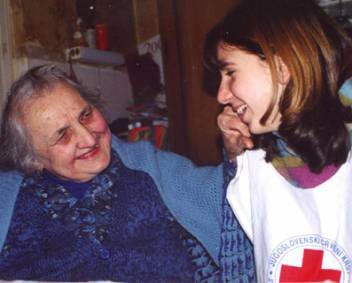 For ten years, the Serbian Red Cross and HumanaS network have lobbied for a better quality of living for older people in Serbia.
For ten years, the Serbian Red Cross and HumanaS network have lobbied for a better quality of living for older people in Serbia.
We have lobbied for many changes in legislation, such as the introduction of social pensions for approximately 100,000 older people who have no income, as well as for stricter laws to prevent abuse and discrimination of older people.
However, the recent new law on social protection does not recognise older people as a distinct group and therefore does not outline any mechanisms for addressing their particular needs.
Older people in Serbia: Facts and figures
- According to the 2011 census, 17.4% or 1.25 million Serbians are above the age of 65.
- In 1981, older people made up 10.4% of the population. In 2002, this rose to 16.5%. Projections show that by 2052, a quarter of the population will be over 65.
- 3.6% of the population is over the age of 80, almost double the 2002 figure of 1.9%.
- The average age of a Serbian citizen today is 42.
- According to the Institute for Statistics in 2012, 11% of the Serbian population live in absolute poverty, with young children and older people being the most at-risk groups.
- 27% of people above the age of 65 receive no pension.
- 11% of those over the age of 60 are illiterate.
What difference has the new law made?
Despite the rapid increase of numbers of older people in Serbia and their specific vulnerabilities, the extent of financial support provided to them in 2011 decreased by 11% compared to 2010. Other age groups saw increases of up to 22% in comparison.
The trend continued in 2012, with older people’s support declining by yet another 12% and other age groups’ support increasing by 12%.
Emergency measures are needed
Serbian civil society has prepared a set of recommendations to ensure older people receive the assistance they need. We are calling on the Ministry of Labour, Employment and Social Policy, the Government of Serbia and the National Parliament to influence changes in the law on social protection so it better services older people’s needs and reaches a larger number of them.
We are also advocating for the system of targeted financial transfers to the poorest municipalities, according to the new law to be put into practice as soon as possible.
These recommendations have been sent to the appropriate ministries and other public institutions and we hope that the amendments to the law will happen by the end of the year.
Find out more about the HelpAge network’s work on social protection.
